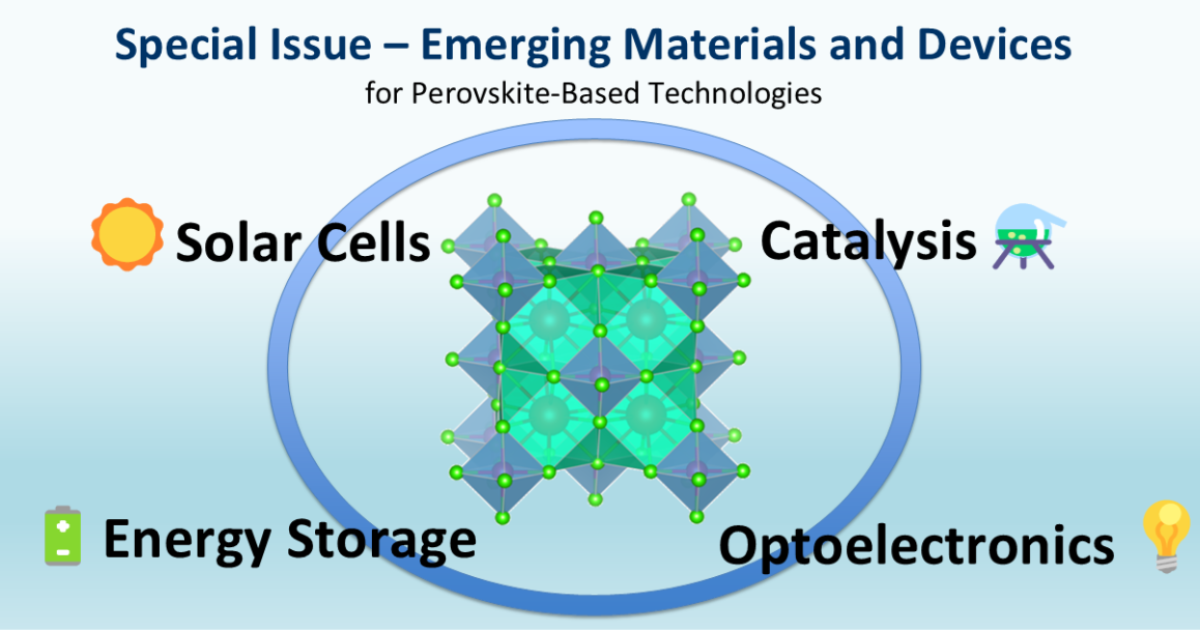Emerging Materials and Devices for Perovskite-Based Technologies
A special issue of Processes (ISSN 2227-9717). This special issue belongs to the section "Chemical Processes and Systems".
Deadline for manuscript submissions: 31 March 2026 | Viewed by 470

Special Issue Editors
Interests: perovskite materials; batteries; catalysis; polymers for energy storage
Interests: thin films; organic and hybrid photovoltaics; stability
Special Issue Information
Dear Colleagues,
Perovskite-based technologies are rapidly transforming multiple research areas, ranging from photovoltaics to light-emitting devices, photodetectors, sensors, and catalytic or energy-storage systems. Their exceptional optoelectronic properties, solution processability, and compositional versatility have enabled remarkable progress toward low-cost and high-performance devices. However, challenges remain regarding long-term stability, environmentally sustainable compositions, interfacial engineering, and scalable manufacturing.
This Special Issue, “Emerging Materials and Devices for Perovskite-Based Technologies”, seeks to gather state-of-the-art contributions addressing these challenges through novel material synthesis, advanced characterization, and innovative device architectures.
Topics of interest include new perovskite compositions (low-lead, lead-free, low-dimensional, and doped systems), defect passivation and interface strategies, scalable deposition techniques, and encapsulation approaches. Contributions on perovskite-based photovoltaics, LEDs, photodetectors, catalytic systems, and energy-storage devices are highly encouraged. Studies involving computational modeling, machine learning, and in situ/operando methods applied to understand degradation and improve device reliability are also welcome. By combining fundamental insights and applied research, this Special Issue aims to outline pathways toward robust, sustainable, and commercially relevant perovskite technologies.
Dr. Arian Espinosa Roa
Dr. Mirna Denisse Barreiro-Argüelles
Prof. Dr. Edgar González-Juárez
Guest Editors
Manuscript Submission Information
Manuscripts should be submitted online at www.mdpi.com by registering and logging in to this website. Once you are registered, click here to go to the submission form. Manuscripts can be submitted until the deadline. All submissions that pass pre-check are peer-reviewed. Accepted papers will be published continuously in the journal (as soon as accepted) and will be listed together on the special issue website. Research articles, review articles as well as short communications are invited. For planned papers, a title and short abstract (about 250 words) can be sent to the Editorial Office for assessment.
Submitted manuscripts should not have been published previously, nor be under consideration for publication elsewhere (except conference proceedings papers). All manuscripts are thoroughly refereed through a single-blind peer-review process. A guide for authors and other relevant information for submission of manuscripts is available on the Instructions for Authors page. Processes is an international peer-reviewed open access monthly journal published by MDPI.
Please visit the Instructions for Authors page before submitting a manuscript. The Article Processing Charge (APC) for publication in this open access journal is 2400 CHF (Swiss Francs). Submitted papers should be well formatted and use good English. Authors may use MDPI's English editing service prior to publication or during author revisions.
Keywords
- perovskite photovoltaics
- perovskite LEDs
- photodetectors
- catalysis
- energy storage
- low-dimensional perovskites
- defect passivation
- charge-transport materials
- scalable fabrication
- stability and degradation
- computational and data-driven design
Benefits of Publishing in a Special Issue
- Ease of navigation: Grouping papers by topic helps scholars navigate broad scope journals more efficiently.
- Greater discoverability: Special Issues support the reach and impact of scientific research. Articles in Special Issues are more discoverable and cited more frequently.
- Expansion of research network: Special Issues facilitate connections among authors, fostering scientific collaborations.
- External promotion: Articles in Special Issues are often promoted through the journal's social media, increasing their visibility.
- Reprint: MDPI Books provides the opportunity to republish successful Special Issues in book format, both online and in print.
Further information on MDPI's Special Issue policies can be found here.







